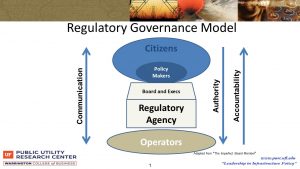Principles for the Governance of Regulators
What is Governance?
“Regulatory Governance” is policies, tools, processes and institutions that are primarily concerned with developing, implementing, administering, enforcing new rules/decisions, and reviewing/revising regulation over time. It is the process of regulating regulations and regulators, and rules that govern the establishment and operation of an organization.
- processes by which organizations make and implement decisions,
- means by which those decisions can be challenged or appealed.
Good Governance provides a systematic way of ensuring that the organisation has a clear set of objectives and functions, and that it acts consistently in pursuit of them.
Ensuring good governance is a systemic way of pursuing good outcomes.

Authority (mandate), Accountability & Communication
- Authority: right to decide action and director resources
- Accountability: bear consequences for decisions
- Communications: gaining knowledge and understanding; primary relationships with stakeholders
Essence of any good system aligns authority and accountability with ability and information. Those who have the best information should be skilled, trained, given authority to make decisions, and held accountable for those decisions.
Ten Principles for Good Governance
- Mandate Clarity: the regulator’s purpose and regulatory objectives should be clearly defined and communicated to the regulator, the regulated, and the general public.
- Requisite Powers: The regulatory agency should have the authority to make final decisions within its statutory domain without having to obtain approval from any other government agency, e.g. the power to set tariffs; establish market, technical and service quality rules, address market power and market design problems, investigate and adjudicate consumer complaints; provide dispute resolution mechanisms for regulated entities; monitor and enforce compliance with its decisions; and apply remedies – including sanctions – to address problem behaviors.
- Independence: there should be a strong presumption in favor of establishing an independent regulator or regulators to regulate infrastructure. (Temporary/transitional option could be a regulatory within a Ministry, when there’s a lack of capacity/expertise.)
- Decision Making and Governing Body: governance arrangements for regulators should promote efficiency, effectiveness and integrity. Multi-member structure supports high quality decisions.
- Funding: regulators must be adequately funded to carry out their role effectively, while funding arrangements should avoid giving rise to conflicts of interest or inappropriate incentives. Funding arrangements should also be transparent.
- Integrity: regulatory agencies must demonstrate high standards of integrity, holding all personnel to high standards of conduct, and avoiding any suggestion that impropriety or illegal behavior is tolerated.
- Predictability: stakeholders should be able to predict, with a high degree of confidence, what decision a regulator is likely to make in particular circumstances. This means establishing and publishing clear decision-making rules, and ensuring that the regulator makes decisions in accordance with the rules.
- Engagement: regulators should engage systematically with stakeholders through transparent, formal mechanisms that guard against “regulatory capture” by one or more stakeholder. Compliance mechanisms should ensure that the regulator has adequate opportunities to obtain key data and opinions to underpin decision-making.
- Accountability and Transparency: regulators should be accountable to the government and parliament, the regulated entities, and the general public for their decisions and use of resources.
- Performance Evaluation: regulators should measure their outputs so that they can update regulatory actions and internal functioning, in order to improve or maintain efficiency. Sector performance trends could be published and performance data should be available to all.
Additional Resources: Frequently Asked Questions
What reform strategies and regulatory structures are best suited in failed / post-conflict states?
